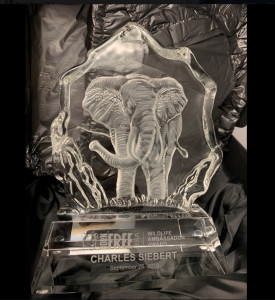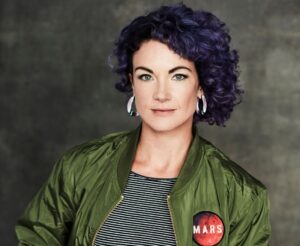 On December 8, 2020, the College of the Environment welcomed Lucianne Walkowicz, an astronomer at the Adler Planetarium in Chicago and co-founder of the JustSpace Alliance, to host their lecture, Cops on Mars: Policing and Weaponization of Space–in the Imagination and Beyond. They were introduced by Professor Mary-Jane Rubenstein and Professor David Grinspoon, both of whom are fellows in this year’s COE Think Tank, which focuses on the theme of “Habitability.”
On December 8, 2020, the College of the Environment welcomed Lucianne Walkowicz, an astronomer at the Adler Planetarium in Chicago and co-founder of the JustSpace Alliance, to host their lecture, Cops on Mars: Policing and Weaponization of Space–in the Imagination and Beyond. They were introduced by Professor Mary-Jane Rubenstein and Professor David Grinspoon, both of whom are fellows in this year’s COE Think Tank, which focuses on the theme of “Habitability.”
The law of space has long been governed by international treaties, most dating back to the mid 20th century. But as both private and governmental interest in and access to space expand, both national laws as well as actions (by nations or non-state actors), may outpace the provisions of these treaties. At the same time, many of the most futuristic visions involving space (e.g. large-scale Mars habitation) are currently well beyond the realm of feasibility or practical deployment for all interested parties. Because of this practical gap, space and the landscapes of other worlds serve mostly as a backdrop against which those interested project their ideas about the future. The placement of law enforcement (in various forms) and the military occurs broadly in these futuristic space settings, from imagination-based learning exercises with children to the concrete plans of governments, to design-focused “vision-building” projects that bridge speculation and practice. Given that there is no a priori reason to assume that law enforcement would need to be included in places where the law itself is mostly unestablished, the placement of police or military actions in space is primarily a vector for the perpetuation of these systems into the future–both in space, and on Earth.
Read more

 On December 8, 2020, the College of the Environment welcomed Lucianne Walkowicz, an astronomer at the Adler Planetarium in Chicago and co-founder of the JustSpace Alliance, to host their lecture,
On December 8, 2020, the College of the Environment welcomed Lucianne Walkowicz, an astronomer at the Adler Planetarium in Chicago and co-founder of the JustSpace Alliance, to host their lecture, 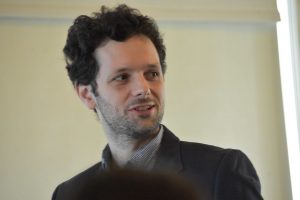 Alexander Wragge-Morley, Clinical Assistant Professor of Liberal Studies and History at New York University, visited campus on February 12, 2020, to share his lecture, “Words, Experience & Non-Resemblance: Representing Nature in 17th-Century England.” He discussed the way English naturalists, particularly botanist John Ray (1627-1705), represented their findings about concrete research in the natural world through figures meant to evoke emotional responses from their viewers.
Alexander Wragge-Morley, Clinical Assistant Professor of Liberal Studies and History at New York University, visited campus on February 12, 2020, to share his lecture, “Words, Experience & Non-Resemblance: Representing Nature in 17th-Century England.” He discussed the way English naturalists, particularly botanist John Ray (1627-1705), represented their findings about concrete research in the natural world through figures meant to evoke emotional responses from their viewers.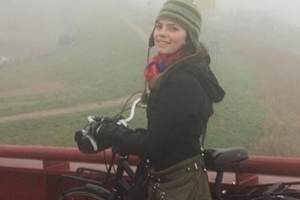 The Careers in Sustainability panel, hosted by the Gordon Career Center, the College of the Environment, and the Sustainability Office on October 4, 2019, included Nora Vogel ’11, director of communications for Coalition for Green Capital.
The Careers in Sustainability panel, hosted by the Gordon Career Center, the College of the Environment, and the Sustainability Office on October 4, 2019, included Nora Vogel ’11, director of communications for Coalition for Green Capital. 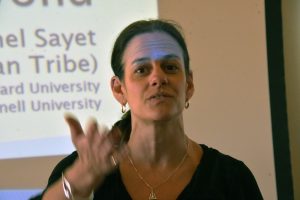
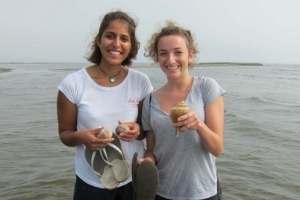 A conversation with Professor Michael Singer, Professor of Biology and Environmental Studies, about his Fall 2019 course BIOL 220/ENVS220: Conservation Biology. The course is a broad introduction to the interdisciplinary, science-based field of conservation biology. While the course includes aspects of economics, politics, ethics, and other fields, it focuses on the biological part of conservation. Much of this biology is ecology, which is Singer’s specialty. At left: BIOL220/ENVS220 students and visitor Dr. Paul Spitzer on a field trip earlier this semester.
A conversation with Professor Michael Singer, Professor of Biology and Environmental Studies, about his Fall 2019 course BIOL 220/ENVS220: Conservation Biology. The course is a broad introduction to the interdisciplinary, science-based field of conservation biology. While the course includes aspects of economics, politics, ethics, and other fields, it focuses on the biological part of conservation. Much of this biology is ecology, which is Singer’s specialty. At left: BIOL220/ENVS220 students and visitor Dr. Paul Spitzer on a field trip earlier this semester.